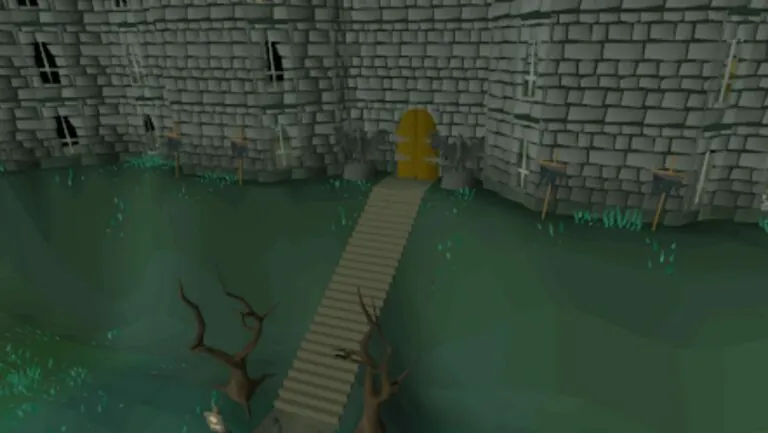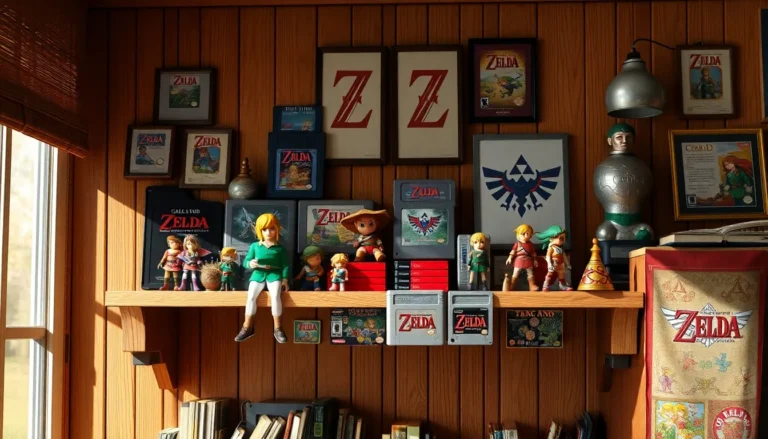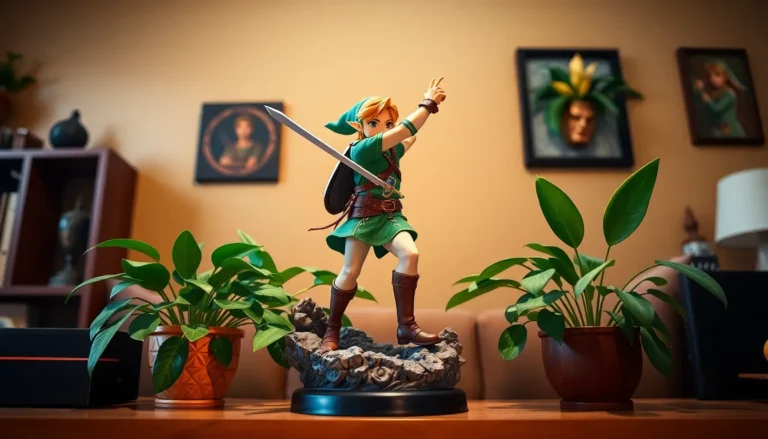Table of Contents
ToggleIn a world dominated by flashy graphics and endless updates, Old School RuneScape (OSRS) stands as a nostalgic beacon for gamers craving a taste of the past. It’s like stepping into a time machine where the grind is real, and every quest feels like an epic saga. Those pixelated graphics might not win any awards, but they’ve got charm that modern games just can’t replicate.
Overview of Old School RS
Old School RuneScape (OSRS) brings players back to the roots of MMORPGs. This version, released in 2013, draws inspiration from a 2007 build of the game, focusing on simplicity and community-driven updates. Nostalgia fuels OSRS’s popularity; players remember long hours spent grinding skills and embarking on challenging quests.
Authenticity defines the gameplay experience. Players enjoy intricate quests that require strategic thinking and problem-solving. Skill training, combat, and crafting provide a sense of achievement often absent in modern games. Each skill, like Fishing or Woodcutting, offers its own unique journey, making progression feel tangible.
Community engagement stands out in OSRS. Frequent player polls shape updates, ensuring the game evolves according to players’ desires. This level of involvement fosters a strong sense of ownership among users, enhancing their connection to the game world. Players collaborate in various activities, like boss fights and minigames, reinforcing community bonds.
Content variety remains a key attraction. Whether questing, skilling, or participating in in-game events, OSRS offers countless ways to enjoy the experience. Regular events, such as holiday specials and seasonal quests, keep the gameplay fresh and exciting. These activities encourage players to return and rediscover the game.
Graphical style carries its own charm. The pixelated visuals evoke memories, making the game feel familiar. Though less sophisticated than modern designs, these graphics contribute to the nostalgic atmosphere that resonates with long-time gamers.
Ultimately, OSRS thrives on its unique blend of nostalgia, player engagement, and authentic gameplay. Gamers seeking a break from modern gaming trends find comfort in its familiar mechanics and community-driven updates.
Gameplay Mechanics

Old School RuneScape features unique gameplay mechanics that enhance player engagement and community interaction. Players experience a blend of nostalgia and strategy through the game’s design.
Core Features
Core features include a variety of skills, quests, and community-driven updates. Players can develop skills across several categories such as combat, crafting, and gathering. Quests often present complex narratives and challenging tasks that demand meticulous planning. Community engagement through player polls allows users to influence game updates, ensuring their voices shape the world they inhabit. Seasonal events add excitement and freshness to the gameplay, encouraging players to revisit and celebrate the game together. Nostalgic graphics, while simple, enhance immersion by creating a familiar atmosphere that resonates with long-time fans.
Combat System
The combat system in OSRS emphasizes strategy and skill selection. Players utilize a range of weapons and abilities to defeat monsters and other players. Each combat style—melee, ranged, and magic—offers distinct advantages and requires different tactics. Players can engage in both player-versus-environment and player-versus-player scenarios, catering to diverse playstyles. Special attacks and prayer usage also play pivotal roles in battles, introducing layers of strategy. Mastering these elements not only provides a sense of accomplishment but also enhances the immersive experience inherent in the game’s design.
Community Engagement
Community engagement plays a crucial role in Old School RuneScape. Players actively participate, shaping the game through their contributions and interactions.
Player-Created Content
Players produce a variety of content, including fan art, guides, and videos. Such contributions enrich the gameplay experience and foster a sense of belonging. Community forums often serve as platforms for sharing these creations, enabling players to celebrate each other’s efforts. Many gamers also engage in creating mods or custom scripts, further expanding gameplay possibilities. The collaborative nature of creative expression strengthens community ties and enhances the overall atmosphere within the game.
Events and Competitions
Numerous events and competitions encourage player interaction in Old School RuneScape. Seasonal events offer unique challenges, often tied to in-game lore, capturing the attention of many players. Competitions like the Player versus Player tournaments showcase skills and strategies, creating excitement among the community. Players eagerly participate, vying for prizes and titles that elevate their status. These organized activities not only promote friendly rivalry but also unify the player base in shared experiences. Regular updates announce upcoming events, keeping the community engaged and motivated to participate.
Comparison to Modern RS
Old School RuneScape (OSRS) and modern RuneScape differ significantly in gameplay experience. Modern RuneScape embraces dynamic graphics and frequent updates, attracting players with its polished visuals. Conversely, OSRS captivates users with its pixelated charm and nostalgic feel, harkening back to gaming roots.
Gameplay mechanics highlight contrasting approaches. Modern RS features streamlined systems and a plethora of conveniences. OSRS prioritizes depth and strategic challenge, focusing on player-driven experiences. Players engage in quests that require meticulous planning and skill enhancement, emphasizing a sense of achievement unlike that of modern counterparts.
Community involvement marks another major distinction. In OSRS, player polls dictate updates, fostering a collaborative atmosphere between developers and gamers. This level of engagement cultivates ownership and shared responsibility among OSRS players. Modern RS, while still community-oriented, leans on a more structured approach to updates, which may lessen player influence.
Content variety also varies dramatically. OSRS consistently introduces new quests and seasonal events, challenging players to explore every facet of the game. This systemic release strategy maintains enthusiasm and encourages ongoing participation. Modern RS, while rich in content, tends to focus on broad updates that may dilute the novelty factor experienced in OSRS.
Skill training presents different philosophies as well. Players in OSRS often experience gradual progress, encouraging dedication and time investment. In contrast, modern RS champions efficiency and quick leveling, appealing to a more immediate gratification mindset.
Overall, OSRS and modern RuneScape represent two distinct philosophies in game design, engaging players in unique ways that cater to varied preferences.
Nostalgia Factor
Old School RuneScape (OSRS) evokes powerful feelings of nostalgia among players. Many enthusiasts fondly remember the early days of the game, characterized by its pixelated graphics and challenging gameplay. A distinctive charm arises from its simplicity, contrasting sharply with the complexities found in many modern titles.
Player-driven updates enhance the nostalgic connection as players influence the evolution of the game. Each poll reflects the community’s desires, fostering a strong sense of ownership and involvement. Quests represent another nostalgic element, often requiring intricate strategies and collaboration, which deepen the players’ attachment to their virtual journeys.
Community engagement amplifies this nostalgia. Individuals share their experiences, creating fan art, guides, and videos that celebrate their time in Gielinor. Events like seasonal challenges and Player versus Player tournaments unite players, driving friendly competition while recalling shared memories.
The persistent pixelated graphics elicit a sense of comfort, reminding longtime fans of the game’s early years. Unlike modern RuneScape, which features sophisticated visuals, OSRS’s design captures the essence of classic gaming, appealing to those who appreciate a more straightforward approach.
Players continually return to OSRS, enticed by the thrill of traditional gameplay and the nostalgia it brings. The variety of content, including quests and skilling opportunities, ensures a lively community. Engaging with a familiar yet evolving environment reinforces nostalgia’s magnetic pull, solidifying OSRS’s place in gaming history.
Old School RuneScape stands as a testament to the enduring appeal of classic gaming. Its unique blend of nostalgia and community-driven gameplay creates a rich environment that keeps players engaged. The pixelated graphics may seem outdated but they foster a charm that modern games often overlook.
Players find joy in the authentic grind and strategic challenges that OSRS offers. The collaborative nature of the game allows for a sense of ownership that resonates deeply with its community. As new quests and events continually emerge, OSRS proves that sometimes simplicity and tradition can create the most rewarding gaming experiences.








